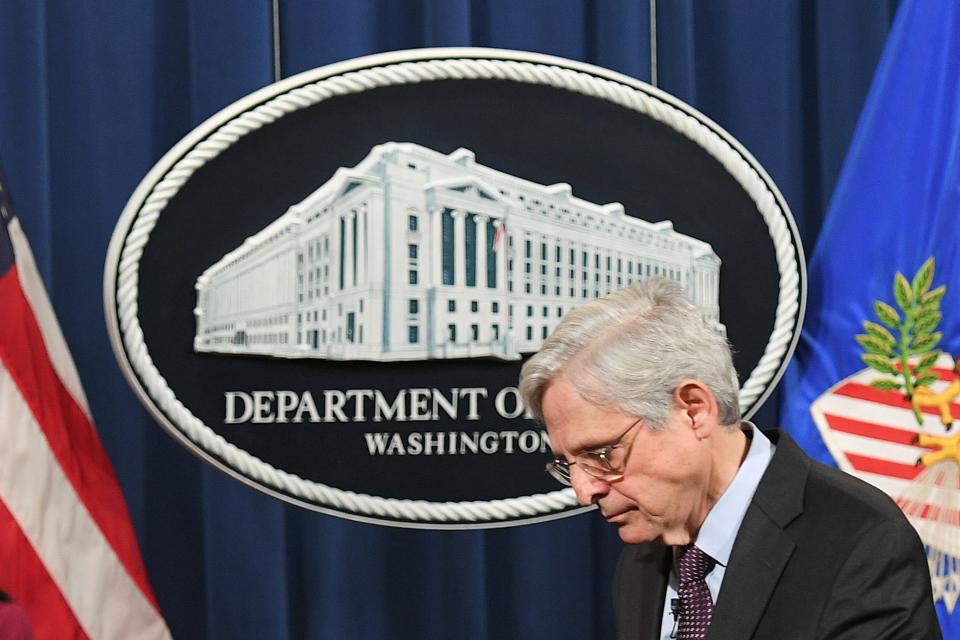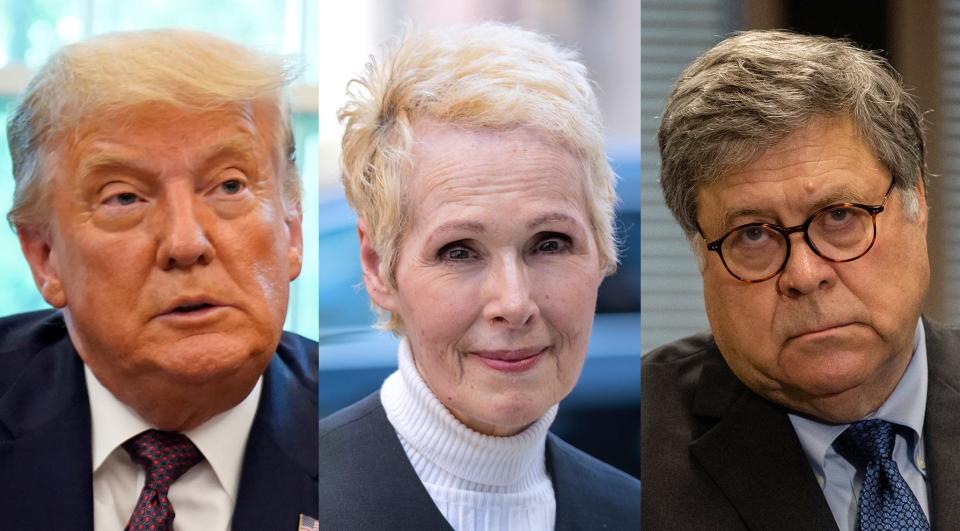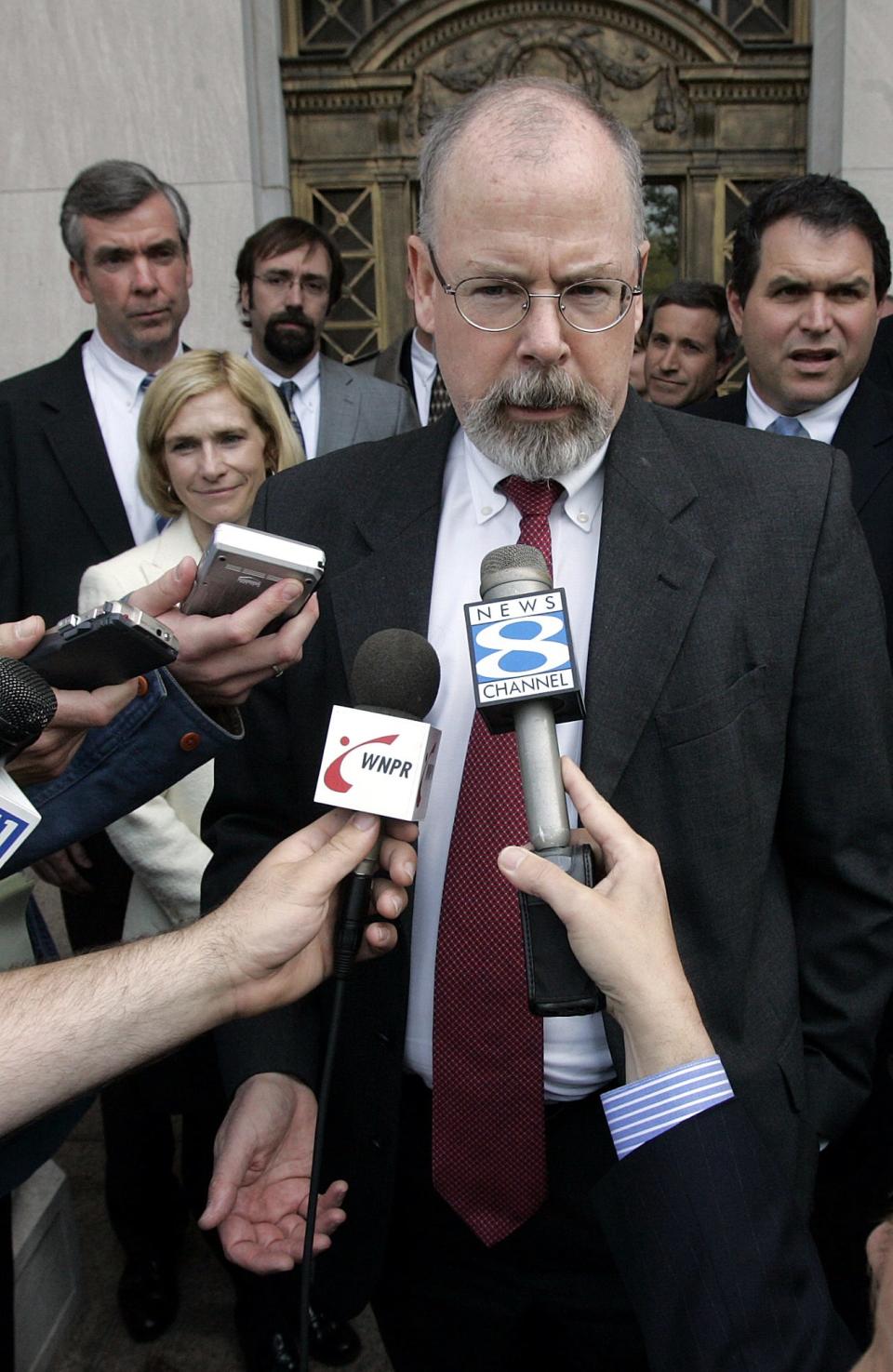It’s complicated: Moving on from Trump at DOJ is a minefield for 'straight-shooting' Merrick Garland
- Oops!Something went wrong.Please try again later.
- Oops!Something went wrong.Please try again later.
- Oops!Something went wrong.Please try again later.
- Oops!Something went wrong.Please try again later.
In the three months since his confirmation, Attorney General Merrick Garland has moved to uncouple the Justice Department from the tumult of the Trump administration.
The former federal judge has rolled back Trump policies that had shielded local police departments from federal scrutiny in the face of social justice protests, launching wide-ranging civil rights investigations into law enforcement operations in Minneapolis and Louisville.
He has repeatedly vowed to reaffirm standards that "protect the independence of the department from partisan influence in law enforcement investigations; that strictly regulate communications with the White House" – all of which were tested mightily during the previous administration.
Breonna Taylor: DOJ to investigate whether Louisville police engaged in abuse
DOJ: Inquiry launched into Minneapolis police operations, a day after Chauvin guilty verdicts

Yet moving on from the long shadow cast by Trump administration is proving to be a complicated legal exercise sometimes limited by institutional norms that the former president regularly shattered.
In recent days, Justice Department lawyers have taken positions in politically charged court battles that have left some Democrats shaking their heads. The Biden Justice Department has appealed a judge's order to release the full contents of a 2019 memorandum that recommended Trump not be charged with obstruction during the investigation of Russian interference in the 2016 election.
Russia probe: Biden DOJ appeals release of full memo on why Trump wasn't charged with obstruction
E. Jean Carroll: Biden DOJ says Trump acted in official capacity when he denied rape allegations
And in court documents filed late Monday in New York, the Justice Department signaled it would continue to defend Trump in a defamation lawsuit brought by writer E. Jean Carroll, who has accused the former president of sexually assaulting her in the 1990s. In both cases, Justice Department lawyers offered tempered support for their positions – referring to Trump’s language in the Carroll case as “crude and disrespectful” – citing legal and institutional precedent for taking the actions.
While the Justice Department moves brought recriminations from Carroll's representatives and countered some Democratic lawmakers who urged it to clear the way for the release of the long-sought obstruction memo, some legal analysts suggested that the decisions had reaffirmed Garland's early vow to distance the department from partisan politics.
"If you didn't know that Merrick Garland was a straight-shooting attorney general before, you sure as heck know it now," said Donald Ayer, a deputy attorney general in the George H.W. Bush administration.
Inherent in the transition to any new administration is the challenge of navigating a thicket of leftover litigation, said Matthew Miller, a Justice Department spokesman in the Obama administration.
"There is a strong institutional pressure (at Justice) to preserve the executive branch," Miller said. "Sometimes that's the right position to take; sometimes it's not."
On Wednesday, Garland confronted the controversy in a Senate hearing, telling lawmakers that the decisions are matters of law – not policy.
"The essence of the rule of law" is that "there not be one rule for Democrats and another for Republicans, that there not be one rule for friends and another for foes," Garland said.
"Sometimes it means we have to make a decision of the law that we would never have made and we strongly disagree with as a matter of policy," Garland said.
Carroll's representatives cry foul
In the heat of the presidential campaign, then-candidate Joe Biden often called out the sitting president for exerting undue influence on the Justice Department, suggesting at times that Trump used the department as his personal law firm.
The candidate's criticism is one of the reasons the Biden Justice Department drew so much notice for seeking to defend Trump in the pending lawsuit.

Justice Department attorneys argued in a court brief filed Monday night that Trump acted in his official capacity when he said in 2019 that Carroll lied about being raped to boost the sales of her memoir.
At issue, the attorneys said, is not whether Carroll's allegations were true or whether Trump's response to them were appropriate, but whether the United States is liable for actions federal employees made within the scope of their employment, the attorneys argued.
"Speaking to the public and the press on matters of public concern is undoubtedly part of an elected official's job. Courts have thus consistently and repeatedly held that allegedly defamatory statements made in that context are within the scope of elected officials' employment – including when statements were prompted by press inquiries about the official's private life," the attorneys wrote.

White House spokesman Andrew Bates said Biden was not consulted by the Justice Department "on the decision to file this brief or its contents."
"And while we are not going to comment on this ongoing litigation, the American people know well that President Biden and his team have utterly different standards from their predecessors for what qualify as acceptable statements," Bates said.
The legal reasoning for the Justice Department filing, however, brought condemnation from Carroll's representatives, who blasted the department for falling short of its legal and "moral" obligations.
“It is horrific that Donald Trump raped E. Jean Carroll in a New York City department store many years ago," said attorney Roberta Kaplan. "But it is truly shocking that the current Department of Justice would allow Donald Trump to get away with lying about it, thereby depriving our client of her day in court.
"The DOJ’s position," Kaplan continued, "is not only legally wrong, it is morally wrong since it would give federal officials free license to cover up private sexual misconduct by publicly brutalizing any woman who has the courage to come forward."

Last month, the Justice Department's appeal of a judge's order to release the so-called obstruction memo came despite the opposition – albeit more tempered – leveled by Democratic senators who urged a clean break with the Trump era.
Sens. Sheldon Whitehouse, D-R.I., and Dick Durbin, D-Ill., had urged Garland not to appeal the judge's ruling.
“DOJ’s actions in this case, and in another recent Freedom of Information Act case seeking information about President Trump’s activities, have raised doubts about DOJ’s candor when characterizing potential evidence of President Trump’s misconduct to courts," the senators wrote. "To be clear, these misrepresentations preceded your confirmation as Attorney General, but the Department you now lead bears responsibility for redressing them."
The memo had been requested by the group Citizens for Responsibility and Ethics in Washington under the Freedom of Information Act.
"The Department of Justice had an opportunity to come clean, turn over the memo, and close the book on the politicization and dishonesty of the past four years," said Noah Bookbinder, president of the government accountability group, asserting at the time that the department's action "undercuts efforts to move past the abuses of the last administration."
‘Institutional interests at stake’
Although Garland's Justice Department has drawn some early fire, William Yeomans, a department veteran who served under five Republican and Democratic presidents, said the department has long been "reluctant" to abandon a position in the face of political pressures.

"It is worth remembering that DOJ has institutional interests at stake in both of these situations that carry over from administration to administration," said Yeomans, whose service stretched from the administrations Jimmy Carter to George W. Bush. "DOJ represents the office of the presidency in court, as well as government officials who are sued in their official capacities.
"What made DOJ’s defense of Trump’s behavior ... so unpalatable was often less that it was representing the president than the substance of what the president had done in his official capacity," the former official said. "I would add that DOJ is always reluctant – and properly so – to change its position in court for no reason other than an election."
It won't get easier
And there are more difficult decisions on the horizon.
A Trump-era investigation into the origins of the Russia inquiry is continuing. Connecticut U.S. Attorney John Durham, first appointed by former Attorney General William Barr, is leading the inquiry, which has so far resulted in the conviction of an FBI lawyer who pleaded guilty to altering an email used to justify the surveillance of former Trump campaign adviser Carter Page.

Federal prosecutors in Delaware also have been pursuing a tax investigation involving the president's son Hunter Biden that began during the Trump administration.
David Weiss, the chief federal prosecutor in Delaware, was left in place by the Biden administration to complete the investigation.
Garland also could face the prospect of determining whether Trump should face charges after he was accused of inciting the Jan. 6 Capitol riot.
Michael Sherwin, who oversaw the sprawling riot investigation before departing the Justice Department earlier this year, said federal authorities were reviewing "everything" during an interview with CBS in March.
"Any decision the Department of Justice makes should be based on an unbiased, nonpartisan interpretation of the law," said University of Notre Dame law professor Jimmy Gurule, a Justice Department official in the George H.W. Bush administration.
"As long as the Justice Department can justify a position on the merits, that's fine. And I think that's what you are seeing with Garland," Gurule said. "He's calling balls and strikes as he sees them and drawing criticism from both sides. I would be more concerned if I saw an en masse flipping of positions that were in line with Democratic policies."
Contributing: Kristine Phillips
'I am not the president's lawyer': Takeaways from Merrick Garland's confirmation hearing
From Trump to Hunter Biden, a lot hangs over Merrick Garland's Senate confirmation hearing
This article originally appeared on USA TODAY: Trump-era cases, from Hunter Biden to Russia, bring blowback for DOJ

